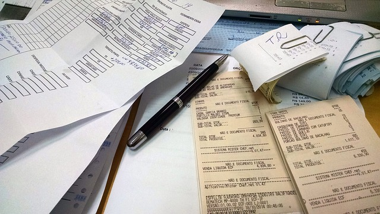
This is part four in a five-part series on starting a contractor business. For part five, please click here. Here are also links to part one, part two and part three.
Accounting can be a challenge for any new business. Contractors have much to keep track of, including materials costs, labor, income, projects that have been paid or not yet paid, and payroll for employees, as well as insurance, quarterly tax payments, and myriad other financial considerations.
This guide provides an overview of the accounting basics that contractors need to know when first starting their businesses including record-keeping requirements and best practices, accounting software options, billing and invoicing, and the need-to-know information about paying taxes and staying in compliance with regulations.

Image via Pixabay
On This Page:
- Tracking Expenses and Earnings
- Accounting Software
- Billing and Invoicing
- Taxes: What You Need to Know
Tracking Expenses and Earnings
As a new business owner, one of the most important things you can do to set your construction business up for success is to develop an efficient and functional method for tracking your expenses and earnings. By being diligent about documentation, tax prep will be much simpler. The following resources provide useful information on how to track expenses and earnings.

Image via Pixabay
Construction companies must manage a variety of essential accounting responsibilities. This resource provides an intuitive flowchart that describes the various accounting responsibilities for managing your construction company.
Choose between the cash accounting method and accrual accounting method. This resource from the IRS describes cash accounting and accrual accounting methodology, the two primary options for managing business accounting needs. While businesses may choose whatever method they prefer, you must use the same method consistently.
Work with a budget. Smartsheets provides easy-to-use Excel templates for preparing and managing your business budget. These templates allow you to document operating income and expenses across a range of categories including accounting and legal, equipment or property depreciation, taxes and licenses, and more.
In addition to a standard budget, you might have specific budgets for various facets of your company’s operations. This resource offers 15 useful Excel templates for different types of budgets, from a Cash Flow Budget Report to budgets for business trips, marketing, and more.
You’ll also need to prepare a Profit & Loss Statement at least annually, although it’s a good idea to do so quarterly in order to pay the appropriate amount for your quarterly taxes.
Don’t forget about tracking mileage. The general rule of thumb is that the first trip and last trip of the day (such as to the office or job site) doesn’t count toward business mileage expenses. But the other trips that you and your employees make throughout the day – traveling to the hardware store for supplies, between job sites, etc. – are valid business mileage. It’s important to track your mileage so that you can use this expense as a tax deduction.
Accounting Software
Many new contractors start out by trying to track and manage their accounting needs manually, by storing receipts and invoices in folders. While there’s no single right way to manage business accounting, most companies find it easier to manage with the use of accounting software specifically designed for the construction industry. These resources offer information on the various accounting software programs available for contracting companies.

Image via Pixabay
Using outdated software or basic accounting software that fails to meet the unique needs of the construction industry are top challenges for new construction companies. This article discusses the importance of selecting the right the right software application that supports your business needs so you can spend more time building than you spend managing your information systems.
Choosing the right accounting software for your business needs can be overwhelming with so many options available. This article outlines the various types of accounting software including web-based applications, free accounting software options, small business payroll and accounting solutions, business management software, and more.
Most accounting software applications offer live demonstrations so that you can evaluate and compare how different programs function. This article recommends asking for demos from the top software apps you’re considering and offers other advice for choosing the right accounting software such as checking user references and reviews, evaluating support services, and more.
If you’re not sure what software programs are best-suited for the construction industry, SoftwareAdvice ranks the top ten construction accounting and job costing software applications for 2016. This resource makes it easy to compare the features and benefits of the top accounting programs.
It’s also helpful to list your must-have features to compare against the features of accounting applications. For instance, this article suggests that most small businesses prefer a few core modules including accounts payable and receivable, payroll and employee management, project or job management, reporting tools, and inventory management.
Billing and Invoicing
Billing and invoicing is one of the biggest accounting responsibilities you’ll have in running your construction company. The following resources offer tips and information on the best practices for effectively managing the invoicing process.

Image via Pixabay
Billing and invoicing is a function that can often be managed with your accounting software. That means you can manage your expenses, track earnings, run profit and loss reports, and create and manage invoices using a single software application. Capterra lists many of the top accounting software applications for the construction industry.
If you’re always in the field and on the go, mobile software applications, such as Joist, for estimating jobs and invoicing clients can come in handy.
Invoicing can be problematic as it enables your clients to delay paying for your services. Instead of invoicing, this article suggests writing your payment schedule in your contracts and requiring your customers to stick to the schedule.
Progress billing is another method often used by construction contractors when a multitude of subcontractors or professionals are involved in a project. This article describes what progress billing is and how it works in the construction industry.
Timely and accurate invoicing is important. When your customers receive timely and accurate invoices, they’re more likely to make prompt payments. Plus, accuracy means you won’t be wasting valuable time correcting invoices and communicating with customers regarding billing errors.
Internal controls are crucial for ensuring that your construction business runs smoothly. Controls such as proper approval of invoices and dual signatures on checks are just two of the best practices for internal controls described in this article.
Invoices should be detailed and easy to understand. This article outlines best practices for invoicing including an itemized list of services, a description of your terms, and more.
To ensure the accuracy of the invoices that you send to your customers, accurate timesheets are important. When your employees fail to appropriately document their time spent on each task or job site, you could end up inadvertently over- or under-billing customers – ultimately making you look bad or causing a loss of revenue.
Getting customers to pay on time starts with setting the right terms and payment schedules upfront. This article offers tips for creating policies and payment terms that stick, such as using graduated payment schedules in which customers pay a portion of the total project cost upfront, another portion mid-way through project completion, and the remaining balance on job completion.
Send out invoices in regular, consistent intervals. When customers don’t pay after several billing attempts, you might offer a payment schedule (allowing them to make installment payments) or other solution to try to work with them before pursuing other, time-consuming avenues for getting your money.
If your efforts to get non-paying customers to make good on their bill with your company fail, eventually you may have to sue former customers in small claims court. This is usually a last-resort method as it’s time-consuming, it costs you money to file the suit, and it is generally unpleasant for all parties involved.
There are some special options available in the construction industry for handling non-paying customers. This article describes options such as mechanics liens and other ways to ensure that you receive payment in a timely manner.
Taxes: What You Need to Know
As a business owner, proper tax planning and preparation is crucial for ensuring your company’s financial stability. No business wants to be stuck with a huge tax bill in April or faced with penalties because they didn’t pay quarterly taxes or made errors in their business tax returns. These resources provide the essential, need-to-know information about tax preparation for your construction business.

Image via Pixabay
Know your business tax write-offs. The best way for business owners to reduce their tax bill is by deducting qualifying business expenses. But it’s hard to know what qualifies as a write-off and what could get you in trouble. This article lists 25 common business deductions and expenses to get you started, while this list covers deductions specific to the construction industry.
AllBusiness.com also provides a list of write-off ideas for small business owners. If your company is an LLC, this list of possible tax write-offs is for you.
Accurate tax returns depend on accurate record-keeping throughout the year. Developing a method for documenting your business expenses means that tax time is less stressful. When you use a software application for tracking income and expenses, inventory, and other financial information, running a few simple reports may be all you need for tax season.
The IRS has a Construction Tax Center with essential information about tax planning and preparation specific to the construction industry, including a detailed Construction Tax Tips section.
You should also find out if your state requires you to collect sales tax on construction services. This article covers the ins and outs of sales tax in the construction industry.
For construction companies, taxes can be more complicated than simple deductions, write-offs, and income. This resource offers ten important tax tips for construction companies covering some of the more complex aspects of tax planning in the construction industry.
Year-end tax planning is important each year. By planning ahead for tax season at the end of the calendar year, you can take steps to maximize your tax savings.
Most construction contractors start businesses because they love the work – not because they’re looking forward to managing the complex accounting requirements of running a business. By following the tips and best practices outlined in this guide and choosing the right accounting software application for your company’s needs, you can focus on running your business instead of trying to make sense of outdated or disorganized accounting methods.
 Resources for First-Time Home Buyers
Resources for First-Time Home Buyers  New Homeowner Projects: The Cost Conundrum
New Homeowner Projects: The Cost Conundrum  America’s Costliest Kitchen Projects
America’s Costliest Kitchen Projects  8 Steps to Good Credit
8 Steps to Good Credit  Fix-It 101: The Fix-It Literacy Guide
Fix-It 101: The Fix-It Literacy Guide 

Are You Familiar With This Topic? Share Your Experience.